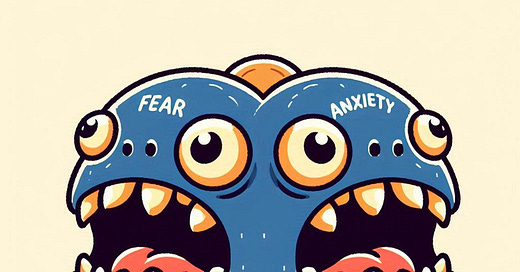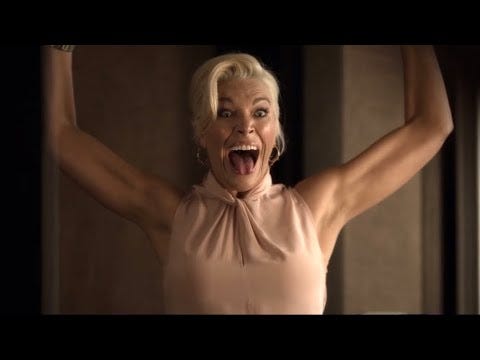I’ve made no secret of the fact that of all the things which I’ve struggled with in my life, the twin hydras of fear and anxiety have always been the biggest monsters I’ve needed to battle with.
I believe some of that stems from my childhood (it’d probably be easier to list out the people in this world who don’t say that their childhood has caused them issues they’ve needed to deal with in adulthood than those who do!) because my mother was a very fear-based person.
Of course, she was like that largely because of her own upbringing. Her own mother was very fear-based, and my mum told me plenty of stories of being restricted as a child from doing the things she wanted to do, because it ‘wasn’t safe’.
Which, predictably enough, meant that my mum rebelled against those restrictions, and she left home (via an ill-fated first marriage) as soon as she could marry without her parents’ permission, at 18.
She struggled with those lessons she was taught all of her life, though.
To her credit, she did try not to give in to her fears, and rarely stopped me from doing things which her own mother would have vetoed.
Although you might not think it if you looked at my (very organised, largely predictable) life now, I was quite the daredevil as a kid. I was in The Air Cadets, which involved many adventures, such as completing The Krypton Factor assault course, as well as flying light aircraft and taking part in many drill, target shooting and sporting competitions. I travelled the length and breadth of the UK during my teenaged years as part of that hobby.
Despite these best attempts, she inadvertently instilled her own belief in me - that most people will stab you in the back, if you give them half a chance. My own negative experiences at school when it came to being bullied backed up that idea, and reinforced the belief until it had become one of my core beliefs as I moved into adulthood.
On a rational level, I knew it wasn’t true, of course. During my late twenties and thirties I spent almost ten years teaching secondary school, and I knew full well that even the kids who were struggling with behavioural issues, were usually having difficulty because of their own family and economic circumstances. I can’t honestly say I ever met a truly bad kid. I still don’t think I have…
With all of that in mind, I’d say that fear and anxiety were the things which were holding me back the most as I moved from my teenaged years into early adulthood.
Once I was self-aware enough to realise that this was the case, in about my mid-twenties, I started reading self-help books, to see how I might find ways to change these limiting emotions.
Or at the very least, find ways to work around them. The older I get, the more I’ve come to think that that’s probably the real crux of the matter when it comes to a lot of issues - some things are inherently a part of being a human being, and fear is definitely one of them.
Why? Because it’s impossible for us to know the future. Because we know we’ll die, one day. And that day might actually be today. Because every time we push ourselves out of our ‘comfort zone’ (or as I like to call it, ‘Dream Death Zone’!) we’re going to feel those pangs of fear, because we’re doing something that’s unfamiliar to us, we’re not sure we can even do it, and we know that there’s every chance that we might fail.
Even the fear of success can be a blocking factor that’s hard to get over, sometimes!
Evolutionarily-speaking, as well, we’re hardwired to look on the negative side of things. Why? Because our ancestors were those who lived long enough to pass their genes on to the next generation. Why? Because they were risk-averse, or - dare we say it - fearful!
Fearful people sired more fearful people, and so it went, on and on through the generations until you came along.
So, all of this is just to explain that being afraid is totally normal, even expected behaviour in a human being. And most other animals.
This then, is not something we’re ever going to get rid of. Indeed, we don’t really want to, because if we were to spend a life without fear, then that would probably mean that we were never taking risks, never trying anything new, not trying things. What kind of life would that be?
Rather, we need to find ways to work around our fears.
I have a few of these tactics. I had a sudden thought this morning that self-help is like building up your own personal book of cooking recipes. After all, you don’t always want to eat the same food. You also don’t always have the same ingredients to hand. Sometimes you’re not very hungry and sometimes you’re ravenous, and all of those things affect which card from your own repertoire of recipes you’ll choose.
Similarly with self-help, sometimes you have reserves of grit and determination and sometimes you’re all out. Your family circumstances might be challenging you, or you might be ill. Any number of things could affect how you respond to challenges. As well as the fact that the actual things you have to face are rarely the same twice. Which makes sense, because if you face the same challenge repeatedly, you become used to dealing with the problem and it becomes part of your comfort zone - which contains all the previously experienced problems you can solve without breaking a sweat.
So I believe the more tools and tricks we can learn, the better. One technique will not always work, all of the time. The situation is different. You’re different.
But if we stock up a toolkit of ways to tackle challenges, then there’s a good chance that you’ll triumph, though.
I learned a while ago that fear and excitement bring up the exact same feelings, physically and physiologically.
https://x.com/melrobbins/status/1096492847262515200?lang=en
We’ve all felt those two emotions, that racing heart, the raised blood pressure, along with elevated breathing rates. You might break out into a cold sweat. Your mind will be going at a million miles an hour, with thought after thought after thought, jostling for supremacy in your brain, yelling to be noticed.
So, why not capitalise on that fact?
When I feel the pangs of fear, I use a technique called Cognitive Reframing.
I ask myself:
‘does it serve me to be afraid, or can I choose to see this as excitement, instead?’
I look at the outcomes I’m going after by pushing myself out of my comfort zone, remind myself of the things I have to gain from taking these risks, and I take some deep breaths.
If it’s stubborn, I might repeat a mantra, whispering to myself ‘I’m excited, I’m excited, I’m excited!’
I might even try a physical cue, such as this corker from the amazing Ted Lasso:
It’s rare that this tactic won’t work.
But then if it doesn’t, I have other tricks you could try instead: https://loulomas.substack.com/t/fear
What do you think? Do you think this is a technique you might be able to use yourself? What impact might it have on your life if you do manage to turn the negative into a positive?
Give me a shout if you try it, I’d love to hear from you, whether it helped or not!






